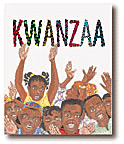#516 Kwanzaa

Items in red are personalized information you provide.
Title Page
The Seven Candles of Kwanzaa
was created especially for
Chloe Marie Smith
at the age of 6
We Love You,
Mom and Dad
2005
Page 4
Hello, Chloe. My name is Zawadi. My name means "Gifts" in Swahili. I am a storyteller, and I'm here to tell you about a very special holiday. It is called Kwanzaa. Have you ever heard of Kwanzaa, Chloe? It means "First Fruits of the Harvest". It is time to celebrate our African-American heritage and culture. We celebrate Kwanzaa from December 26th to January 1st.
Page 7
We celebrate many holidays such as Christmas and Thanksgiving, but Kwanzaa is special! Yes, Chloe, gifts are given, but the true meaning of Kwanzaa can be found in the good feeling that comes from learning about our past.
Page 8
It is very important to remember our past, Chloe. Kwanzaa helps us to celebrate the ties that bind us to our African heritage.
Page 11
Kwanzaa can be celebrated in many ways. In keeping with the spirit of Kwanzaa, we can wear African dress and decorate our home in the red, green and black colors that symbolize our holiday. Red is for our struggle, green is for the hills of Africa, and black is for the color of our people.
Page 12
Many families enjoy celebrating the Kwanzaa holiday with relatives and friends. They come together to tell traditional stories, to prepare special meals, to sing, to dance, and to play music. Everyone has a wonderful time! Why don't you invite Kaylee and Allyson to celebrate with you this year in Springfield?
Page 15
Perhaps the most important part of the Kwanzaa celebration is the study of the seven principles. These principles should be learned and practiced every day, Chloe, not just during the Kwanzaa celebration.
Page 16
There are seven candles called the Mishumaa Saba that symbolize the seven principles of Kwanzaa. These candles are placed in a special candle holder called a Kinara. We light one candle each day.
Page 19
With the light of the first candle, Chloe, we begin to learn about the first principle called Umoja. It means unity. We must attempt to create unity within our families, our communities, and our nation.
Page 20
The second candle stands for Kujichagulia. It means self-determination. We should know who we are, stand up for ourselves, and do what is right.
Page 23
The third candle is lit for Ujima. It stands for collective work and responsibility. Each member of the family is given an ear of corn called vibunzi to symbolize the African harvest. The harvest represents our hard work, and without hard work there is no reward.
Page 24
On the fourth day, Chloe, we light the candle for Ujamaa. Ujamaa means cooperative economics. One way to practice the principle of Ujamaa is to do well in school, get a good education, and one day contribute your skills to your community.
Page 27
The fifth candle is lit for Nia. Nia means purpose. Our purpose, Chloe, is to honor our ancestors and our parents. We must work together to restore our communities and our families. With purpose we can accomplish many wonderful things.
Page 28
The sixth principle of Kwanzaa is Kuumba. It means creativity. We can express our creativity in many different ways. Whenever possible, we should use our creativity to help each other and to better our communities.
Page 31
The last candle to be lit on our Kwanzaa celebration is for Imani, which means faith. We must always remember our continuing struggle, Chloe, and believe in ourselves, our parents, and our future. We must keep the faith of our ancestors.
Page 32
On the last day of our holiday, we gather together for the Kwanzaa Karamu or feast. On the table is a straw mat called a mkeka. On the mkeka is placed a basket filled with mazao or fruits and vegetables. This act symbolizes the product of our unified effort. Gifts are given to one another. Although the gifts are simple, usually a book or something made by hand, they are special because they are given with love on Kwanzaa.
Page 35
The Seven Principles of Kwanzaa
"Umoja" - Unity
"Kujichagulia" - Self-determination
"Ujima" - Collective Work and Responsibility
"Ujamaa" - Cooperative Economics
"Nia" - Purpose
"Kuumba" - Creativity
"Imani" - Faith